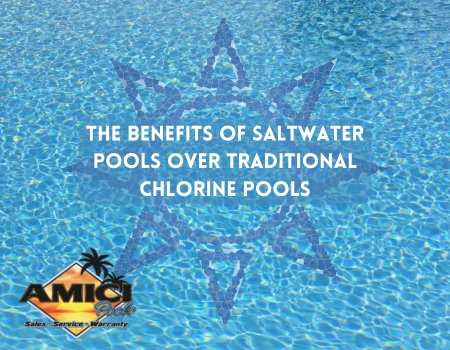When it comes to choosing a swimming pool, one of the biggest decisions homeowners face is whether to opt for a saltwater pool or a traditional chlorine pool. While both systems effectively keep pool water clean and safe, saltwater pools have become increasingly popular due to their numerous advantages. From lower maintenance requirements to improved skin and eye comfort, saltwater pools offer several benefits over their chlorine counterparts. Let’s explore why many homeowners are making the switch.
 1. Gentler on Skin and Eyes
1. Gentler on Skin and Eyes
One of the most noticeable benefits of a saltwater pool is the softer feel of the water. Traditional chlorine pools often cause irritation, leading to red eyes, dry skin, and a strong chemical odor. This is because chlorine pools require the regular addition of concentrated chlorine, which can be harsh on the body.
In contrast, saltwater pools use a chlorine generator to convert salt into chlorine at a lower, more consistent level. This results in water that is gentler on the skin and less likely to cause irritation. Swimmers often report that saltwater pools feel silkier and more comfortable, making them a great option for people with sensitive skin or allergies.
2. Lower Chemical Exposure
While both types of pools rely on chlorine to sanitize the water, the way chlorine is introduced makes a significant difference. In traditional pools, chlorine is added manually in the form of tablets, granules, or liquid, which can lead to fluctuations in chlorine levels. This inconsistency can cause water quality issues, requiring frequent testing and adjustments.
Saltwater pools, on the other hand, generate chlorine continuously at a controlled rate, reducing the need for additional chemical additives. As a result, swimmers are exposed to fewer harsh chemicals, creating a more natural and enjoyable swimming experience.
3. Easier Maintenance
Maintaining a traditional chlorine pool requires frequent chemical testing, balancing, and manual chlorine additions. This ongoing process can be time-consuming and costly.
Saltwater pools, however, require less day-to-day maintenance. The salt chlorinator automatically regulates chlorine levels, reducing the need for constant monitoring. While regular maintenance is still necessary, such as checking salt levels and cleaning the generator cells, the workload is significantly lower compared to traditional pools. This makes saltwater pools an attractive option for busy homeowners who want to enjoy their pool without excessive upkeep.
4. Cost Savings Over Time
Although saltwater pools have a higher initial setup cost due to the need for a salt chlorinator, they can be more cost-effective in the long run. Traditional chlorine pools require continuous purchases of chlorine and other balancing chemicals, which add up over time.
With a saltwater system, chlorine is generated from salt, which is inexpensive and only needs to be replenished occasionally. Additionally, the automation of chlorine production reduces the likelihood of costly mistakes caused by improper chemical balancing. While the salt cell in the chlorinator does need replacement every few years, the overall operating costs tend to be lower than those of a chlorine pool.
5. Better for the Environment
Saltwater pools are often regarded as a more eco-friendly alternative to traditional chlorine pools. Since they produce chlorine naturally, they eliminate the need for storing and handling large quantities of chemical chlorine, which can be hazardous to both humans and the environment.
Additionally, saltwater pools produce fewer chloramines—the byproducts of chlorine that cause the strong “pool smell” and irritation often associated with traditional pools. This results in cleaner, healthier water with fewer chemicals being released into the environment.
6. More Enjoyable Swimming Experience
Many pool owners find saltwater pools to be more enjoyable for swimming. The lower chlorine concentration makes the water feel softer and more natural. Unlike chlorine pools, which can leave swimmers with a lingering chemical smell, saltwater pools provide a more refreshing and pleasant experience.
Additionally, saltwater pools maintain more stable water chemistry, leading to clearer and cleaner water. This reduces the need for frequent shocking or chemical adjustments, allowing for more time spent swimming and less time on maintenance.
7. Reduced Wear on Swimwear and Pool Equipment
The high chlorine levels in traditional pools can be harsh on swimwear, causing fabric to fade and deteriorate faster. Chlorine can also corrode metal components in pool equipment, leading to more frequent repairs and replacements.
Saltwater pools have lower, more consistent chlorine levels, which are less damaging to swimsuits, pool liners, and metal fixtures. This helps extend the lifespan of pool equipment and accessories, reducing long-term maintenance costs.
Saltwater pools offer a range of benefits over traditional chlorine pools, including gentler water, lower chemical exposure, reduced maintenance, and cost savings. While the initial investment may be higher, the long-term advantages make saltwater pools a preferred choice for many homeowners. With their softer feel, stable water chemistry, and environmentally friendly approach, saltwater pools provide a more enjoyable and sustainable swimming experience.
If you’re considering installing or converting a pool, a saltwater system may be the perfect choice for a healthier, more efficient, and low-maintenance swimming environment.
